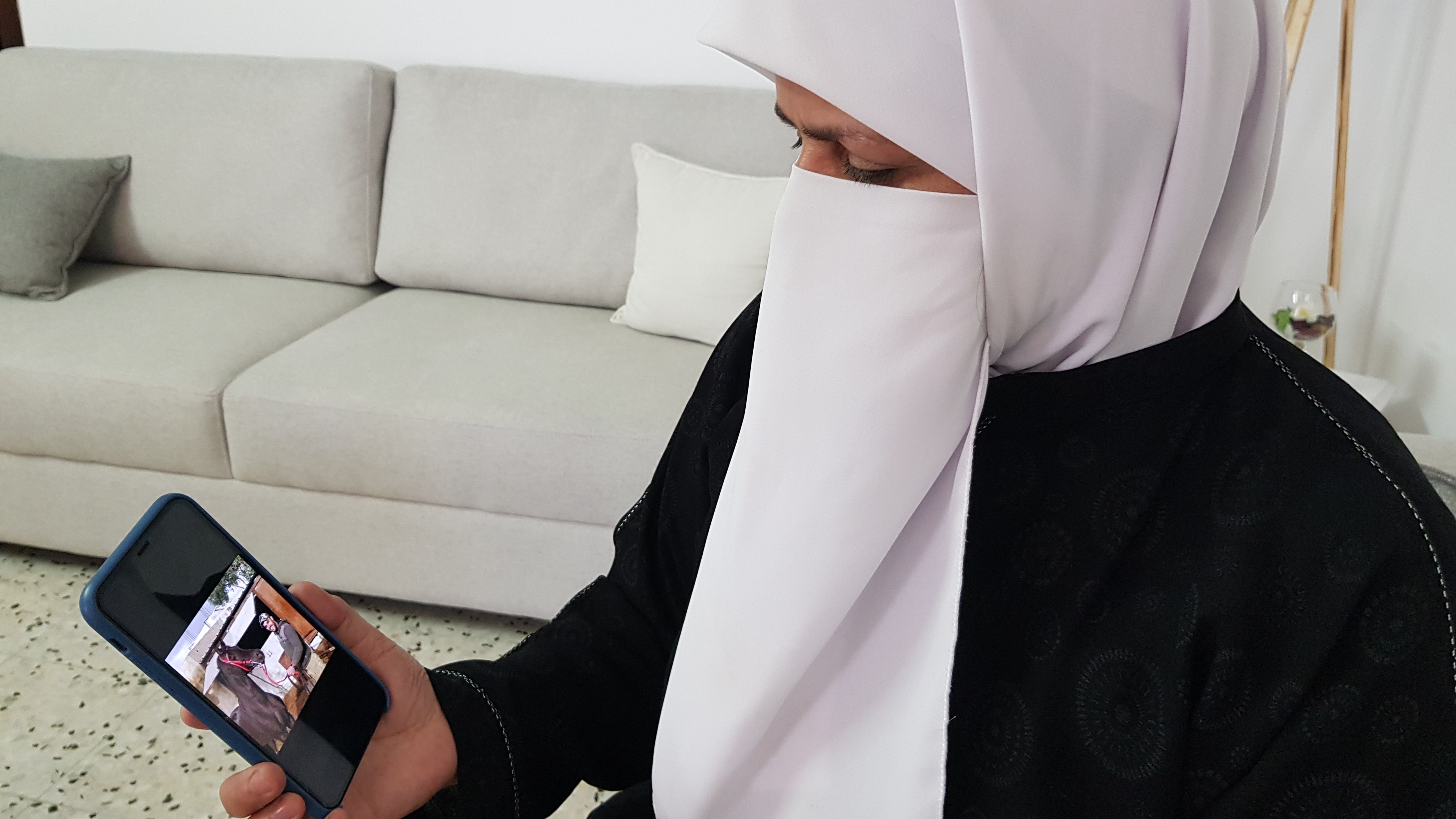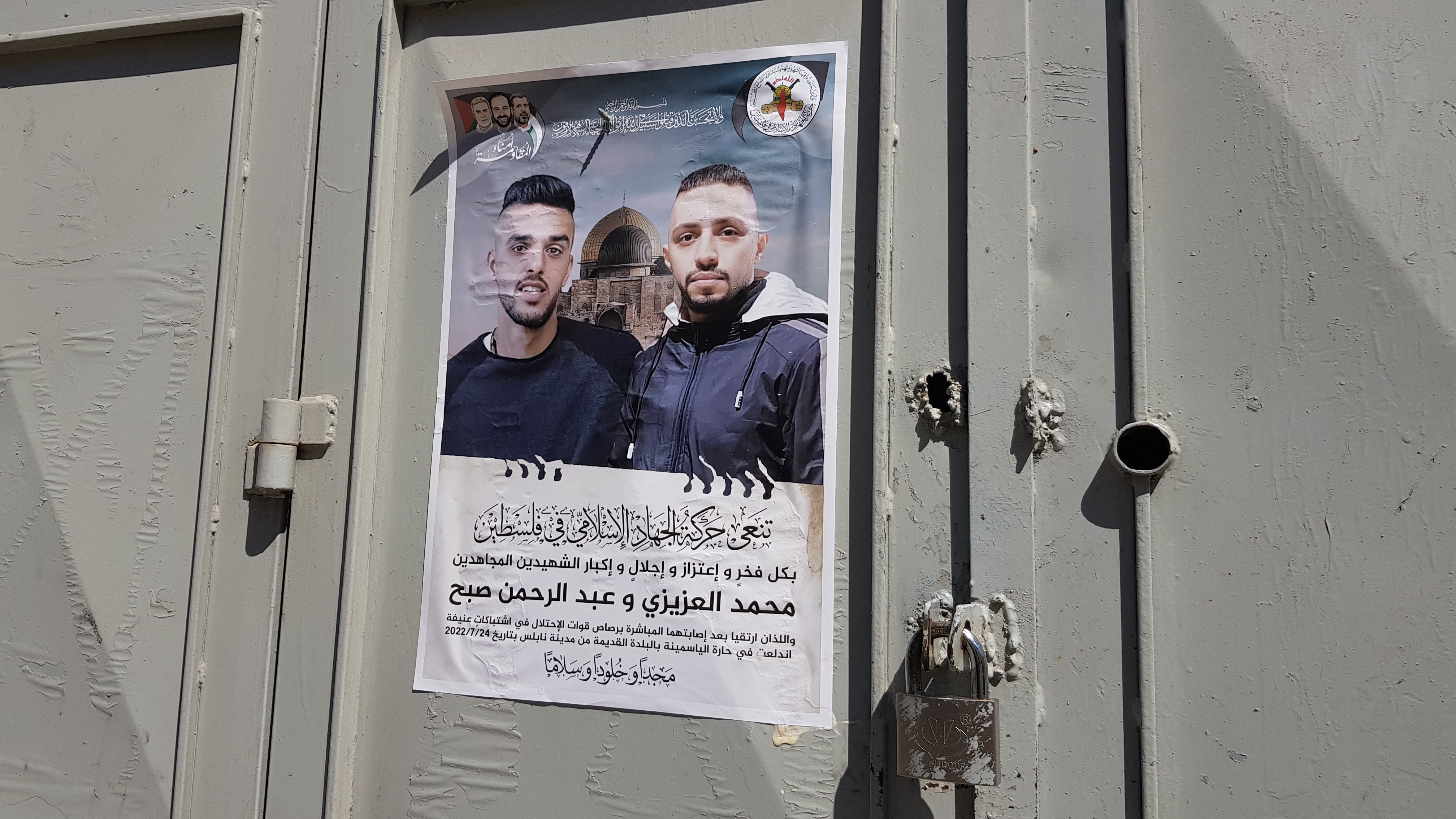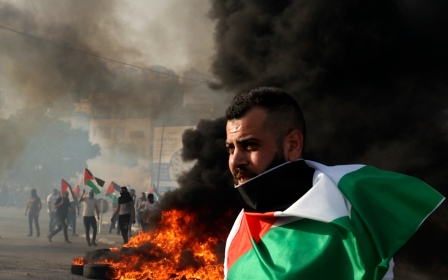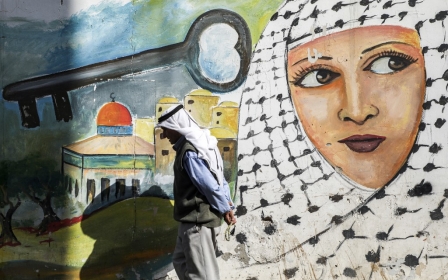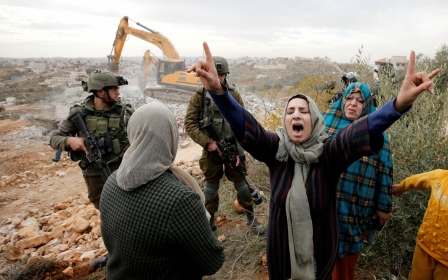Nablus mourns dead fighters as West Bank resistance grows
In the midst of his wedding preparations, Abdul Rahman Sobh surprised his family when he abruptly told them he wanted to separate from his fiancee.
His mother and wife-to-be couldn't believe it, as everything had been going well between the young Palestinian couple from Nablus, who have been in love for years.
"Whenever we discussed the details of the wedding his mind seemed to wander elsewhere," Nisreen al-Oiwai, Sobh's mother, told Middle East Eye. "It was as if he was preparing for his martyrdom," she added, remembering with pride her 28-year-old son, who was killed on 24 July by the Israeli army, in fierce street gun battles in the city's old town.
Sobh, known by his nickname Abboud, was one of two Palestinians killed that day, the other one being Muhammad Azizi, 25. The pair had been staying with five other resistance fighters at Azizi's home in the al-Yasmineh neighbourhood in Nablus's old town when an Israeli force raided the city to apprehend some of their group.
Sobh and Azizi were killed in the three-hour gunfight that followed, while the rest of the fighters escaped.
New MEE newsletter: Jerusalem Dispatch
Sign up to get the latest insights and analysis on Israel-Palestine, alongside Turkey Unpacked and other MEE newsletters
Muttering the phrase "Praise be to God" repeatedly, Oiwai pointed to where the traces of his blood could be seen after his death.
Weeks before the incident, Sobh had asked for a halt to the construction work at the flat where he was to move to with his future wife. A family counsellor at a Nablus's court, where Sobh had gone to make the separation official days later, managed to persuade him to change his mind.
"It has become clear to us that the couple have no problem, but the groom said he was a martyr in the making," a document signed by the family counselling office read. "He said he didn't want to break the heart of his fiancee, who he said was the best and most beautiful thing to have happened to him."
Sobh changed his mind and did not break the engagement, the counsellor said. Less than a week later, he met the fate he knew was coming.
Joining the resistance
Sobh's life changed drastically in February, after three Palestinian fighters were shot and killed by the Israeli army in a targeted operation in broad daylight, his mother said.
Among those killed in the ambush, which was reminiscent of assassinations carried out by the Israeli army in the Second Intifada, or Palestinian uprising, was Mohammed al-Dakhil, a close friend of Sobh's.
'Lately, when he had not been home for days, I would ask where he had been. He would tell me to get used to his prolonged absence'
- Mother of killed Palestinian fighter
He had sold a tractor he owned at the time and bought a gun instead, before joining like-minded armed young Palestinians in the northern West Bank city.
The group, which has since grown into a band of fighters calling themselves the Nablus Brigade, has become a primary target of the Israeli army.
On Sunday, Israeli soldiers stormed the Al-Yasmineh neighbourhood for the first time since 2002, when it invaded the city as part of its military operation against Palestinian resistance groups at the height of the Second Intifada.
The force entered the Old City shortly after midnight and besieged the house where Sobh and other fighters were staying, taking cover at an adjacent house.
After three hours of fighting, in which the Israeli army fired anti-tank missiles at the house, the fighters managed to flee the scene.
According to eyewitnesses and owners of the surrounding houses, Sobh and Azizi were giving cover to the other fighters as they withdrew, at which point they were fatally shot.
Oiwai, walking in the empty flat where Sobh was due to move in with his wife after their wedding in September, said that her son's choice to join the armed resistance had been a long time coming.
In 2009, his uncle, Anan Sobh, was killed by the Israeli army. Soon after, he himself was detained, aged 17, along with his two brothers. Both these events played a big part in his life.
"Lately, when he had not been home for days, I would ask where he had been. He would tell me to get used to his prolonged absence," said Oiwai.
The Nablus Brigade
According to Israeli media, the raid on Sunday was aimed at apprehending one of the most wanted Palestinian fighters in Nablus, Ibrahim al-Nablusi.
The young fighter is accused of leading shootings against Israeli targets, including in the vicinity of Joseph's Tomb, a major flashpoint in the city.
The first known attempt to apprehend Nablusi is believed to have happened in February, during the deadly ambush in Makhfiya neighbourhood. He was initially thought to be among the three people killed that day, before he emerged at their funeral.
In a similar way, his fate was unknown shortly after the Sunday raid, but once again he showed up at Sobh and Azizi's funerals, boosting his reputation in the city as an elusive fighter.
Translation: Ibrahim al-Nablusi, the man wanted by Israel and survivor of the assassination attempt at dawn today, participates in the funeral of two of his comrades, Aboud Sobh and Muhammad Al-Azizi in the city of Nablus in the occupied West Bank, 24 July 2022.
Armed resistance in Nablus has largely faltered since 2007, after years of Israeli operations, in coordination with the Palestine Authority, to dismantle Fatah's armed wing, al-Aqsa Martyrs Brigades, the leading resistance group in the city.
But since the re-emergence of organised armed resistance in the neighbouring city of Jenin, there has been a new momentum in Nablus, led this time by the armed wing of Islamic Jihad, al-Quds Brigades (Saraya al-Quds).
The group announced the creation of the Nablus Brigade, similar to the Jenin Brigade that was formed last year. While both groups say they are inspired by the Islamic Jihad movement, their members are affiliated with different Palestinian groups, including Fatah, Hamas and the Popular Front for the Liberation of Palestine.
As more are killed, more enlist
As their popularity grows, the Nablus fighters attract more Israeli scrutiny. And with each fighter who is killed or arrested, more are enlisting.
This was true of Azizi, who was moved by the death of the three fighters in February and decided not only to join the struggle but also to host other fighters at his home.
'Parting is difficult, but I am convinced that my brother was faithful to the path he chose'
- Brother of killed Palestinian fighter
He provided financial and logistical support, equipping his house with surveillance cameras and armoured doors, and sheltering fighters whenever they needed a place to stay, according to his father, Bashar Azizi.
"On the night of his martyrdom, Muhammad noticed the entry of the Israeli special forces through the surveillance cameras, and that's when the fighters started to take up position," Bashar told MEE.
"The idea of martyrdom was all that he thought about, and he always insisted on the unity of the fighters despite the political difference."
Amir Azizi, Muhammad's younger brother, said his brother was quiet and rarely spoke. When he did, it was about resisting the Israeli occupation.
"Parting is difficult," said Amir. "But I am convinced that my brother was faithful to the path he chose."
This conviction was echoed by Oiwai when she described Sobh, who had come to visit her on the night before his death.
"Pray for me," he told her after having his last meal with her, just before he left the house.
"The only thing I regret now is that I did not hug him on the day," said Oiwai, tears running down her face.
This article is availbale in French on Middle East Eye French edition
Middle East Eye delivers independent and unrivalled coverage and analysis of the Middle East, North Africa and beyond. To learn more about republishing this content and the associated fees, please fill out this form. More about MEE can be found here.


